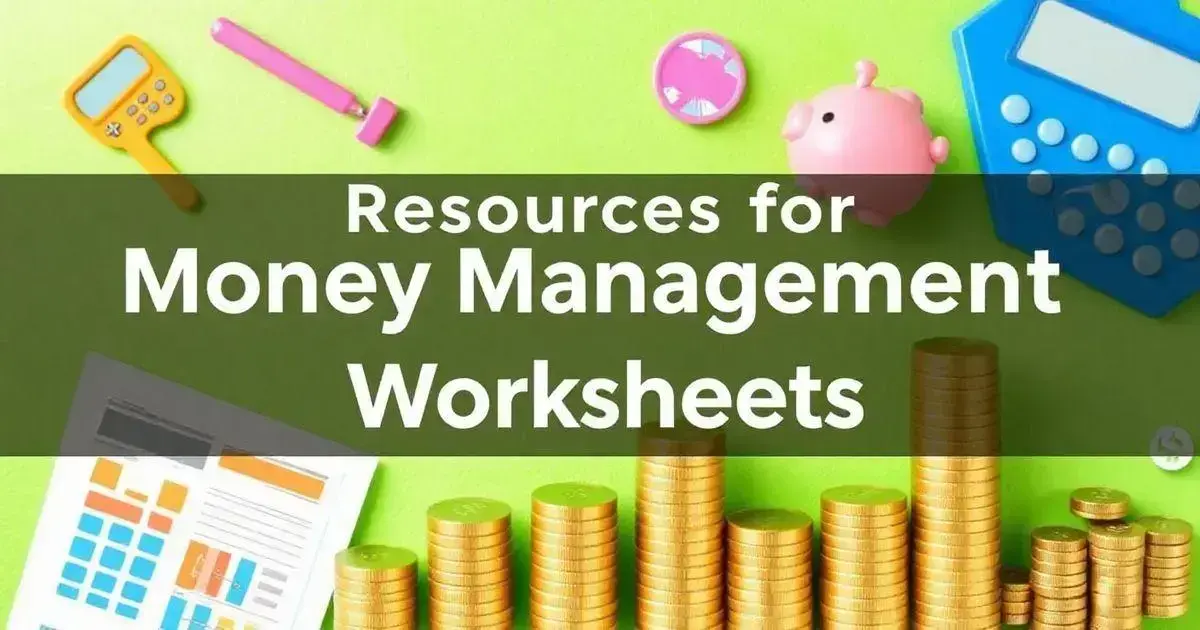Money Management Worksheets are a powerful tool for anyone looking to organize their finances. They give you a clear view of your spending and show where you can improve. It’s the first step toward making smarter financial decisions.
They help identify spending habits and prioritize what truly matters. Plus, they make it easier to plan goals, like saving for a trip or paying off debt. All of this in a practical and accessible way.
Ready to transform your relationship with money? Keep reading to discover how these worksheets can help you achieve financial stability and reach your goals.
Understanding Money Management Worksheets
Understanding money management worksheets is essential for anyone seeking to enhance their financial literacy. These worksheets help individuals organize their finances systematically. They typically include sections for income, expenses, and savings, allowing users to see where their money goes each month.
By using money management worksheets, people can identify spending habits that may be draining their funds. This insight empowers them to make informed choices on where to cut back and how to allocate resources more efficiently.
Additionally, these worksheets can also serve as a roadmap for achieving financial goals, such as saving for a vacation or planning for retirement. Regularly updating the worksheet ensures that users stay aware of their financial situation and can adjust their budgeting strategies as necessary.
Incorporating money management worksheets into daily financial routines fosters discipline and accountability, which are critical for maintaining sound financial health.
Benefits of Using Money Management Worksheets

Using money management worksheets offers several benefits that can enhance your financial well-being. First, these worksheets provide a clear overview of your financial situation by documenting all sources of income and expenses. This transparency allows you to see where your money is going each month, making it easier to identify wasteful spending.
Additionally, these worksheets encourage disciplined budgeting. By allocating specific amounts to various categories such as food, transportation, and entertainment, you can prioritize essential expenses and reduce frivolous purchases.
Another key benefit is the ability to set financial goals. Money management worksheets help you outline savings targets, whether for emergencies, vacations, or retirement, providing a motivational framework to work towards.
Moreover, regular use of these worksheets can lead to better financial habits. As you consistently track your progress, you become more aware of your spending behaviors, which can ultimately lead to smarter financial decisions.
In summary, money management worksheets are not only practical tools but also vital resources that help you gain control over your finances and build a secure financial future.
How to Create Your Own Money Management Worksheet
Creating your own money management worksheet is a straightforward process that can significantly enhance your budgeting capabilities.
First, start by identifying your income sources. This includes your salary, freelance work, or any passive income you may have. Document these amounts in one section of the worksheet.
Next, outline your fixed expenses, which typically include rent, mortgages, insurance, and any other bills that remain constant each month. This will give you a clear understanding of your mandatory financial commitments.
Following fixed expenses, list your variable expenses, such as groceries, dining out, and entertainment. These costs can fluctuate each month and offer more flexibility in your budget.
Once you have your income and expenses documented, calculate the difference to see if you have a surplus or a deficit. A surplus means you can save or invest, while a deficit indicates areas where you need to cut back.
To enhance the effectiveness of your worksheet, consider including a savings tracker, where you can set specific savings goals, such as for an emergency fund or a vacation. Regularly reviewing and updating your worksheet will help you stay on track and adapt to any changes in your financial situation.
Tips for Effective Money Management

Effective money management requires a combination of strategies that can help individuals achieve financial stability. Here are some tips to enhance your money management skills:
1. Track Your Spending: Use a budgeting app or a traditional spreadsheet to monitor your daily expenses. Knowing where your money goes will help you make better decisions.
2. Set Financial Goals: Define short-term and long-term goals. Whether saving for a new car or planning for retirement, having clear objectives will guide your budgeting.
3. Prioritize Savings: Treat savings like a recurring expense. Set aside a portion of your income every month before spending on other items.
4. Avoid Impulse Purchases: Implement a 24-hour rule for non-essential purchases. This break can help you decide if you truly need the item.
5. Review and Adjust: Regularly review your budget and financial goals. Financial situations can change, and being flexible is essential for effective money management.
By following these tips, you can cultivate better financial habits and ensure a more stable financial future.
Common Mistakes in Money Management
Common mistakes in money management can lead to financial difficulties. Recognizing these errors is the first step toward improvement. Here are some frequent pitfalls:
1. Ignoring a Budget: Many people go through life without a clear budget. Without tracking income and expenses, it’s easy to overspend.
2. Living Beyond Means: Spending more than one earns can lead to debt. This often happens when individuals rely heavily on credit cards.
3. Neglecting Savings: Failing to save for emergencies is a serious mistake. It’s important to set aside funds monthly, striving for at least three to six months’ worth of living expenses.
4. Impulse Buying: Purchasing items without planning can be costly. It’s advisable to take time before making non-essential purchases.
5. Overlooking Small Expenses: Small purchases add up quickly. Tracking these can reveal surprising leaks in your budget.
6. Not Reviewing Financial Goals: Goals should be reviewed regularly to ensure they remain relevant and achievable. Adjusting them as life changes is crucial.
Resources for Money Management Worksheets

There are numerous resources available for money management worksheets that can help individuals improve their financial skills. Some popular options include:
1. Online Templates: Many websites offer free or paid templates that can be easily downloaded and customized. Sites like Vertex42 provide a variety of Excel worksheets for different budgeting needs.
2. Financial Apps: Tools like Mint and YNAB (You Need A Budget) provide mobile-friendly solutions for tracking income and expenses. These apps often include built-in worksheets to help manage your money effectively.
3. Books and Guides: Financial literacy books often come with worksheets or templates. Titles by authors like Dave Ramsey or Robert Kiyosaki are recommended for their comprehensive insights.
4. Community Resources: Local non-profits and community centers sometimes offer workshops on financial literacy that include access to worksheets.
5. Government Resources: Websites like Consumer Financial Protection Bureau provide worksheets and educational material on budgeting and money management.
By utilizing these resources, individuals can gain a better understanding of their finances and enhance their money management skills.
Final Thoughts on Money Management Worksheets
Money management worksheets are powerful tools to help individuals gain control of their finances. By regularly using these worksheets, you can track your income and expenses clearly, enabling better budgeting and saving habits.
Implementing effective money management strategies starts with understanding your financial situation. These worksheets guide you step by step, from identifying income sources to setting achievable financial goals.
Avoid common mistakes by staying disciplined and regularly reviewing your financial plans. Make adjustments as needed to stay on target with your objectives.
Overall, good money management is essential for reaching financial security and achieving your dreams.


